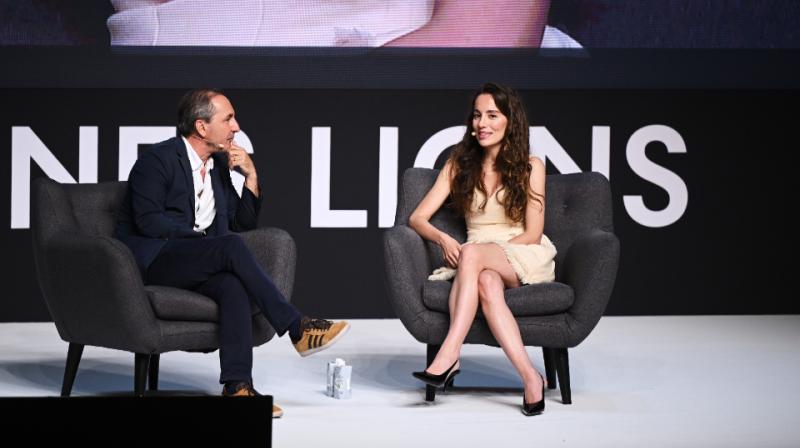On day one of the Cannes Lions International Festival of Creativity, OpenAI's CTO Mira Murati and Accenture Song’s CEO David Droga explored the intersection of AI and human creativity.
AI and the nacho chip
Droga labelled artificial intelligence (AI) as an anchor nacho chip – the one which is linked to all the fillings and the other chips.
He then asked Murati to narrate a story through which he wanted to showcase that AI and technology do not have all the solutions.
Revealing the story, Murati said, “It was pretty hard to explain what I did to my parents pre-2022. When we put out ChatGPT in 2022, she started asking it questions. She asked everything in Albanian and kept getting answers. Then she asked when will Mira get married. That’s when my sister told her it’s not magic, it just gives answers.”
“That’s a delicious counterbalance of what technology can do and that’s why I love that story so much,” said Droga.
Droga then went on to probe Murati about the team size at OpenAI, considering the evolution of ChatGPT and the introduction of Sora for video.
She revealed, “Our team is fairly small. The research teams are focused. A handful of people work on the main project. The broader team takes the technology into the real world.”
Technology vs creative
Droga brought up the topic that many have been debating for years – with the influx of technology what happens to the creative.
“We are at a creative festival. We are caught between the excitement and enthusiasm of technology and the terror and nerves of it going to devour creative,” he said, before asking Murati for her point-of-view from the technology side.
“Creative per se is the pursuit of discoverability in human life. As tools become more available, a broader set of people can use them. It wouldn’t then require understanding the technology to do something with it. That’s what was unique about ChatGPT. The technology was available for a while. As the interface became easier to use, suddenly so many people started using it,” she said.
“We entered the public sphere just a couple of years ago with ChatGPT. It’s amazing what the trajectory of this technology looks like. They are coming to the public at a fast speed and broadly,” she added.
Giving his thoughts about it, Droga added, “Departments that I grew up in will be changed. A lot of roles in agencies and design businesses – some believe the need for that staff will disappear. While I’m excited and optimistic about AI, I’m still anxious and nervous about the industry. It’s going to modify how we’ll be doing things. It has started by being in everyday lives already.”
But he also pointed out that it will help differentiate good creative from the average.
“Majority of our clients are using it for efficiency and productivity which is the low-hanging fruit. A lot of clients haven’t grasped the future and are thinking they don’t have to pay a copywriter anymore. So, we need to find out what needs to be paid for and what doesn’t. When everyone has access to it (AI), everyone has the best practices. That’s where creativity steps in. We need to manifest ourselves into creating the best creatives and there have always been evolutions of our roles,” he said.
“People want to be black and white about it. Not all creativity is worth saving though. A lot of things that are deemed creative – are not always. Advertising is deemed creative but some of them are written by research which isn’t creative,” he added.
The future
Murati claimed that technology has to be shaped in a way that will shape society in the future.
“Depending on how we develop these tools, it will shape our society. If we can get help on other things like perhaps research, brainstorming then there’s more time for us to think in depth,” she said.
Murati added that the risk of technology being misunderstood is at the top of the things that make her nervous.
“The technology in itself is not enough to be helpful to society. Everything else around it will help. We need to talk to the likes of policymakers. That will prepare society for what’s to come. We need to have guardrails to stop misuse of technology as well,” she stated.
She also believed that AI has not been penetrative enough.
“In the last couple of years, people have understood what can be used. So, it has to be made accessible and free to use for anyone who has internet access,” she said.
Coming back to the misuse of it, given that it’s an election year globally, she added, “We have been worried about deepfakes and have been working to get people to understand when images are created by AI or a real person. You have to think about safety from the beginning. When you first start training the models. Our approach at OpenAI is to integrate safety from the first step.”
She added, “The advent of the internet and social media has come with a lot of downsides and unexpected risks. Now we have an opportunity to do this differently.”
Droga concluded the session by stating how he believed that AI and learning how to use it is a non-negotiable skill.
He said, “We need to get ahead of it and jump into it. It’s an exciting and wonderful future and I keep telling my children to understand it (the use of AI).”

.gif)










